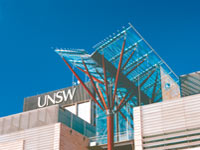Petroleum Eng Open Learning - PTRLES5341
Stream Summary
Faculty: Faculty of Engineering
School: School of Petroleum Engineering
Contact: School
Program: 5341 - Engineering Science
Award(s):
Graduate Diploma in Engineering Science (Specialisation)
View stream information for previous years
Stream Outline
The stream covers the fundamentals and application of reservoir engineering, petroleum technology, business principles and business management. They are specifically designed for personnel already working in the upstream petroleum industry who wish to acquire tertiary qualifications to enhance their knowledge and to further their career opportunities.
The program articulates to the Masters of Engineering Science program with full credit for courses completed in the Graduate Diploma program. Students may exit from this proposed program with a Graduate Diploma award if they have completed the required course requirements. Alternatively they may elect to go on to complete the full Master’s program. A credit average (65%) is generally required to articulate to the next level in the sequence.
Entry Requirements
Entry 1 -
Students need a recognised four year Bachelor degree in a relevant discipline of engineering with a minimum 65% average. (NOTE: The minimum average required for entry is as determined by the UNSW Postgraduate Entry Score Calculator. Students from a non-211 university in China need a minimum 70% average.
Entry 2 -
A 3- or 4-year Bachelor of Engineering or Science combined with at least one year of full-time relevant professional and/or responsibility in the upstream petroleum industry is required. Students through this entry pathway are required to demonstrate work experience in the Upstream Petroleum Industry (i.e. the exploration, reservoir engineering, drilling and production of oil &/or gas). An entry interview may be required.
A portfolio is to be provided to support the application for Entry 2 pathway for postgraduate coursework study, including the following:
- A cover letter explaining your motivation to work in the petroleum industry and proposed study program at UNSW. The letter should tell us about your interests and achievements and be no more than 400 words.
- A CV that provides information on industry responsibility including employer, dates employed in each position and a description of the position roles (no more than 50 words for each position).
- Information that demonstrates aptitude for learning and relevant experience including evidence and details of employer sponsored training and Vocational Education and Training (VET). This may include brief summaries (no more than 2,000 words total) of selected projects outlining your leadership and/or substantial contribution.
- Contact details of two referees, including at least one past or current employer. A letter from an employer verifying the role performed would be highly regarded to support the consideration of relevant industry experience.
- Certificates of relevant training including VET.
- The portfolio is to be provided in electronic format as part of the application process.
Stream Structure
- 24 UOC of Core Disciplinary courses
- 24 UOC of Advanced disciplinary courses
Disciplinary Knowledge Courses (12-18 UOC)
- PTRL5013 Petroleum Geology (6 UOC)
- PTRL5014 Petroleum Geophysics (6 UOC)
- PTRL6001 Reservoir Engineering 1 (6 UOC)
Two courses from the following list:
- PTRL6003 Well Pressure Testing (6 UOC)
- PTRL6004 Numerical Res. Simulation (6 UOC)
- PTRL6009 Well Drilling Equip&Operations (6 UOC)
- PTRL6012 Drilling Mud (6 UOC)
- PTRL6016 Well Completions & Stimulation (6 UOC)
- PTRL6025 Well Control & Blowout Prevent (6 UOC)
- PTRL6027 Casing Design & Cementing (6 UOC)
- PTRL6028 Practical Well Planning (6 UOC)
- PTRL6029 Directional H. & M. Drilling (6 UOC)
- PTRL6031 Deep water well engineering (6 UOC)
- PTRL6032 Coal Seam Gas Engineering (6 UOC)
Recognition of Prior Learning (RPL)
Stream Aims
- Updating qualifications and knowledge to meet or maintain professional accreditation standards
- Providing opportunities for continuing professional development
- Providing opportunities for interaction with those at the cutting edge of the discipline
- Providing a preliminary step towards postgraduate research degrees.
- Updating technical knowledge and skills in an existing engineering specialisation
- Acquiring new knowledge and skills in a different engineering specialisation
Volume of Learning
The stream is designed to develop and enhance career opportunities for graduate engineers, including cross-training, re-training and advanced level technical specialisations. The stream also includes extensive research training components.









